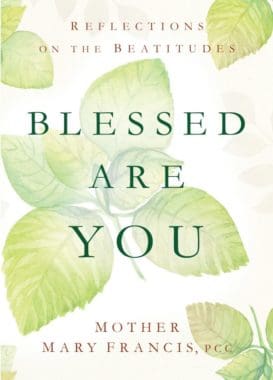Blessed are the clean of heart: for they shall see God
(Matt. 5:8)
The cleaner of heart we are, the fewer dark corners do we cherish in our heart for depositing ideas of which we are extremely fond and on which no other ideas shall be allowed to intrude. These are the dark corners to be illumined so that the light and sight of God can come in. If, when I am corrected, I have a stockpile of reasons to show my benefactor how wrong he is, if I am offered a new perspective and have another stockpile of false erudition for rejecting it, I am simply lost in my own clutter. I don’t see God. I am dirty of heart in a deeper and much more dangerous way than in the sense of carnal impurity. What are “dirty thoughts?” Are they not less those engendered by the demands of nature or the insistence of men or the television of imagination than the satisfiedness that makes it impossible to see God? Let us repeat it: our blessed Lord certainly meant physical cleanness of the body and mental cleanness of thought when He proclaimed the blessedness of the clean of heart. But He meant more. The Scriptures expand His thought by many parables. We remember how the thieves and the prostitutes got into the heavenly banquet, according to our Lord’s own forecast, and we recall who got thrown into the outer darkness and were left there to gnash their teeth. Look again at that prodigal son. The Scriptures say in very plain language that he had wasted his whole inheritance on harlots and loose living. Yet, in that exquisite scriptural vignette that is given us as a symbol of God’s forgiveness, the boy was clean of heart. He was so humbled. He was so contrite. He became a penitent whose greatest hope was to be allowed to be a servant in his father’s house. And that takes us over into the second shining characteristic of the clean of heart: truthfulness.
The prodigal son was physically unclean. He had been impure in the physical sense, and in just about every other sense as well, when he came to his father and said, “I am not fit to be your son; could I be a servant in your house?” At that moment, he was clean of heart. The bedraggled, hungry boy did not condition truthfulness. He did not say: “Well, at least I can be a servant here.” He inquired if there was any possibility that he could be a servant. And what did the father who is the figure of God the Father do? He interrupted the self-accusations. You can see the finger of the father on the lips of the son. Really, he stopped the boy with a kiss and forgave him. And the son was made clean of heart. The proud and complacent are the really dirty of heart, and they do not see God.
There is another familiar scriptural passage that could be interestingly rewritten in the light of truth. It is the beginning of Genesis. Suppose at the initiation of that sorry tale, the serpent had not lied? The whole story began with untruthfulness. Then, Eve listened to the lie, disobeyed, panicked, and proceeded to do what human nature invariably seeks to do: she drew someone else into her predicament. Adam was easily enough drawn. But if the two had been clean of heart in contrition, how would the story run? When Eve said to God, “The serpent deceived me” (Gen. 3:13), one catches little undertones and overtones of her really blaming God for her whole downfall. Who created the serpent anyhow? Who put him into the garden? “The serpent deceived me.” Suppose, instead, she had said: “Oh, God, forgive me! I was ambitious, I was vainglorious, I was so proud. I wanted to be You. I wanted to take over Your role.” Suppose she had confessed: “I was so foolish. You gave me everything, and I listened to a snake. Have pity on me.” Would Eve then have needed to be cursed?
Then, what of the happy supposition that Adam had said: “Oh, God, forgive me! I was Your first creation in Your own image. I should have been strong to help my mate. Instead of that, in her moment of weakness, I failed her. I am really all at fault. I am the one on whom she should have depended for strength; but I failed her, God, and I failed You.” Perhaps the thorns and thistles of Adam’s future lot and his bequest to all his progeny would never have appeared. The fallen can always regain cleanness of heart. They need only be truthful and contrite. For all of us, the implication of cleanness of heart is that we have been cleansed. Who shall stand before God and say: “Behold, your unspotted one!”
If educability and truthfulness are two outstanding characteristics of the clean of heart, there are also two special effects of cleanness of heart. The first is a great lightness of spirit. Like the peacemakers whom we shall next consider, the clean in heart are happy children of God. We see this joy very apparent in Francis and Clare of Assisi. They were so light of heart, “always joyful,” as the nuns testified of Clare at the process of canonization. Joyful to be forgiven, light of heart to have met the truth and acknowledged it.
When we are always ready to be taught, are really truthful confronting ourselves before God, we have a rewarding sense of wonder. We can say to ourselves in Old Testament terms, just as Job did, “Yes, you maggot, you! You worm, you!” and still know that we are the beloved of God. It is not too attractive a prospect to witness to maggothood or wormdom per se, but to be a maggot or worm beloved of God is not uninviting. It is to be a very noble kind of worm. Who could mind being a worm cherished by the Lord? The cleanness of heart that comes of being teachable and truthful brings a reward not of depression or defeatism nor, much less, of despair, but of joy. In our acknowledged wormliness alone does our butterfly possibility lie.
A second effect of cleanness of heart is freedom. Here again we see clearly the interlockedness of the Beatitudes in the wholeness of Christ’s love. For we have already seen the freedom which is the property of the poor and the meek. When we are not infatuated with our own opinions and judgments, we are prepared to yield them over when truth shows them up as charlatans. To be sure, the yielding up involves pain. Life is full of pain; learning is full of pain. Any learning. There can be a certain drive toward it, a kind of exhilaration; but there is also much labor and perspiration involved, much fatigue for mind and body. If pain is part even of secular learning, we can scarcely be surprised that it is often painful to learn the only thing God told us to learn: to be meek and humble of heart. It should not come as a surprise that there is a lot of work involved in becoming and remaining clean of heart. It is not a crash course.
We have our own opinions, judgments, evaluations. We are ourselves. But we are clean and free when our roots are not in any of these but in God. This seems to be what is meant in the Beatitude, “Blessed are the clean of heart, for they shall see God.” See Him in eternity, yes. But they shall see through to Him right now, too. Of course, let us say it again, this takes more than just a bit of doing. We need to prostrate ourselves before God and ask Him: “Show me where I am unclean of heart. What do You want me to surrender that I may have the great reward of the clean of heart?” And we have to be prepared to let Him answer, and to realize that the freeing and happy rewards of truth come only to the truthful. The prodigal son doubtless had to work on himself so as not to say, accusing his father instead of himself, “Why did you let me go out, young as I was, into a wicked world? It is really all your fault.” Poor Eve did the equivalent of that in a somewhat more subtle mode, but to God. “Why did You put the snake there? Things were going along so well before he came slithering along.” The boy, truthful, humbled, educable, was immediately cleansed. Eve, less candid and only humiliated, needed long penancing to become clean of heart. No doubt most of us line up alternately with the contrite wanton son and the self-excusing Eve. For them, to be given the first robe of restored innocence or to be made mother of the human race, it was necessary to be cleansed and to see God. The unworldliness of the clean of heart is not lightly achieved. That bears repeating. The educability and truthfulness that make freedom and lightness of heart possible are never effortless. But the reward is great. We see God.
+
This article is adapted from a chapter in Blessed Are You by Mother Mary Francis, PCC, which is available from Sophia Institute Press.
Art for this post: Cover and featured image used with permission.





